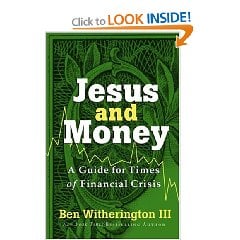
http://www.amazon.com/exec/obidos/isbn=1587432749/bakerbookhouseA
http://www.brazospress.com/Book.asp?isbn=978-1-58743-274-3
We will be discussing the sticky issue of finances from a Biblical and Christian point of view. I will leave to your reading of the book all of the Biblical analysis of key texts and ideas. In this series of posts I will instead focus on some myths about money in Christian circles, and some of the cultural factors that affect our thinking that Christians need to have deprogramed from their thinking. Thus the first thing we must do is some ground clearing exercises— specifically we have to talk about deprogramming from the dominant culture milieu and models of handling money.
The subject of this first post is learning the difference between luxuries and necessities. With it comes a Biblical principle— somebody else’s necessities should take priority over your luxuries when it comes to priorities of spending and giving.
But what is a necessity and what is a luxury item? Of course immediately it can be seen that one man’s luxury can be another man’s necessity, to some extent. For example, some people need an automobile to get to work. Work is some distance from home and public transportation is so bad or non-existent that one cannot rely on it, and it is not economically feasible to take a taxi all the time.
So certainly, for many people in many countries having a reliable means of transportation is needed, and more specifically having a car or truck is needed. If you live 40 miles west of Butte Montana in the middle of nowhere and you work in Butte, that’s a beaut of a commute, especially if you have no car or truck. This however in no way justifies buying a luxury SUV and calling it basic transportation. No one needs a gas-guzzling SUV under any circumstances. If you have a large family they you need a van or a mini-van, but a gas guzzling luxury vehicle— nope, not a necessity ever. It will become apparent already that when you begin drawing up lists, as you should, and check them twice, about what are necessities for you and what are luxuries, your list will differ from others. But on no Christian’s necessity list should be products or vehicles which would be luxury items for EVERYONE.
Why not?
Shouldn’t Christians dress for success, strive for excellence, show the world how God has blessed them with bling??? In a word— no, when it comes to the first and third of these things. Christians should have a conscience about how their choices affect other people in this world, particularly those who live in poverty. They need to de-enculturate themselves from the lifestyles of conspicuous consumption that are so prevalent in American culture.
When my wife and I moved to Durham England in 1977 so I could do my PhD in Biblical studies we quickly learned how many of our assumptions about what were necessities were wrong— food, shelter, clothing were necessities. Owning a car in a town full of good public transportation was not. Nor did we need a refrigerator in that temperate climate. We had a cool pantry, and we shopped more often. This worked fine. Nor did we need a telephone of any kind—- we lived in a B.C. world, that is a Before Computer or Cellphone world, in a civilized country and we did just fine without various things we had previously assumed were necessities in life. As it turned out— Not So Much.
Lesson One for the New Year— start drawing up your lists of necessities and luxuries in your life. Begin to figure out where you’ve been fudging when it comes to necessities. Calling a luxury item a necessity when it is not for you, is fudging.
A person living in Phoenix with a respiratory illlness may well need both an oxygen tank and air conditioning where ever he is. Few of us need the former, and only some of us NEED the latter. Be ruthless as you draw up your list— narrow down the necessity column to what actually are your necessities. Then we will have a baseline from which to work. Then you will find out how much your spending is out of control and focused on luxury items. Then you will begin to discover how living within your means, and more simply, frees up resources so you can actually use a lot of your resources for the purposes the Bible says they should be used for.
Think on these things.


